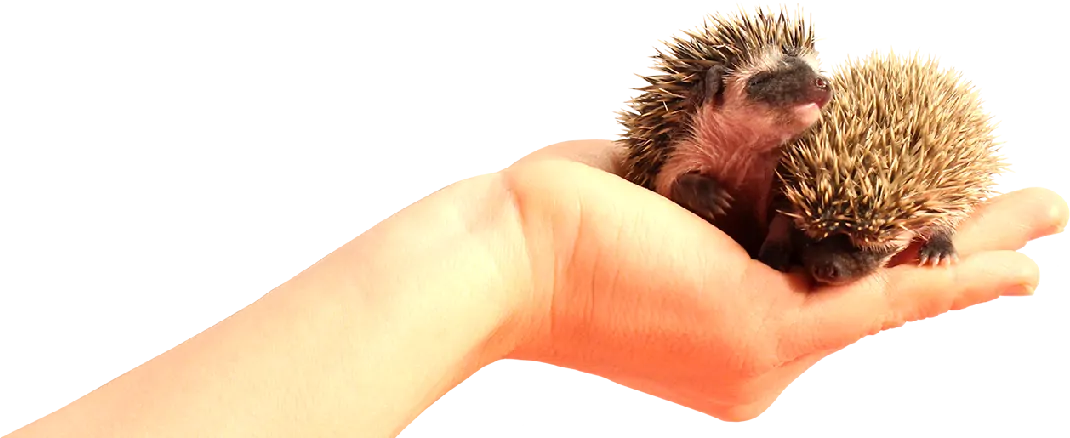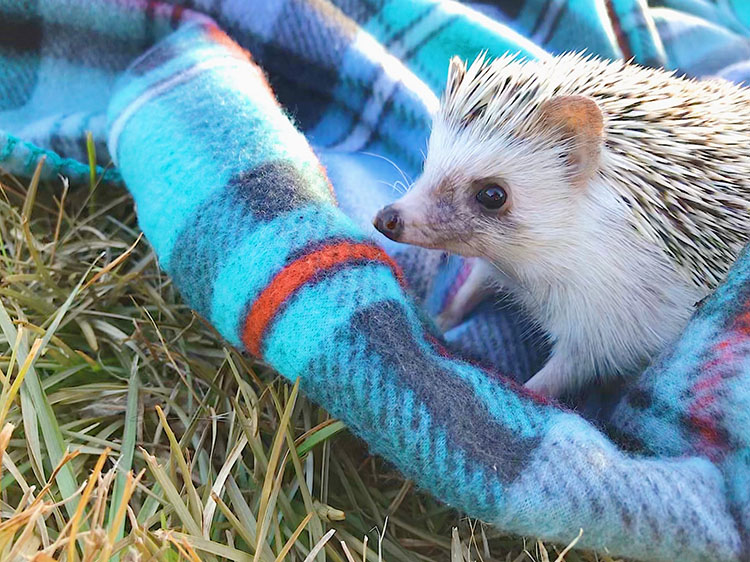Hedgehog Health Guarantees

All baby hedgehogs sold by Granite State Hedgehogs are covered by a 14-day non-congenital health guarantee, 18-month congenital health guarantee and lifetime Wobbly Hedgehog Syndrome guarantee. We offer the longest congenital health guarantee among hedgehog breeders.
How the health guarantees work
14-Day Non-Congenital Health Guarantee
We (Granite State Hedgehogs) include at the time of sale a 14-Day Non-Congenital Health Guarantee with all baby hedgehogs purchased through us. The guarantee commences at the transfer of ownership from Granite State Hedgehog to you (the owner) and ends 14 days from the date of transfer.
If you suspect during the first 14-days of ownership that your hedgehog has a viral and/or bacterial infection, you must contact us by phone or email before bringing your hedgehog to the vet. After making contact, we will decide the best course of action to take (owner seeking appropriate vet care or Granite State Hedgehogs).
What the Non-Congenital Health Guarantee Covers -
- The cost of medication within the first 14-days up to the cost of the animal.
- If you (the owner) decide you would like for us (Granite State Hedgehogs) to seek vet care for the animal on our behalf, you agree to provide transportation of the animal to/from our facility and we agree to cover all associated vet costs while under our care.
- In the event of unexpected death (before or after vet visit within the first 14-days of ownership) - an option of replacement or refund up to the remaining balance after accounting for the cost of medication at a max-refund value of the full purchase price of the animal less associated medication costs.
What the Non-Congenital Health Guarantee Does Not Cover -
-
- Diagnostic testing
- Emergency vet fees
- Office visit fees
- Owner neglect
18-Month Congenital Health Guarantee
We (Granite State Hedgehogs) include at the time of sale an 18-month Congenital Health Guarantee with all baby hedgehogs purchased through us. The guarantee commences on day 1 of the hedgehogs life and ends at 18-months of age. This guarantee does not cover neglect or viral and/or bacterial infections caught outside of our care.
All claims under the Congenital Health Guarantee must be accompanied by a necropsy report completed and signed by a licensed veterinarian. We will not accept a tentative diagnosis from clinical examination while the hedgehog is still living.
What the Congenital Health Guarantee Covers -
- Replacement of the hedgehog with a new (6-8) week old baby of your choice.
- Reimbursement for positive necropsy-confirmed congenital health defect testing up to the original purchase price of the animal.
What the Congenital Health Guarantee Does Not Cover -
- Medication
- Diagnostic testing
- Office visit fees
- viral and/or bacterial infections
- owner neglect
- non-congenital health defects
- Emergency vet fees
Wobbly Hedgehog Syndrome Guarantee
We (Granite State Hedgehogs) include at the time of sale a lifetime Wobbly Hedgehog Syndrome Guarantee with all hedgehogs purchased through us (excluding rescues). This guarantee does not cover neglect or viral and/or bacterial infections caught outside of our care.
All claims under the Wobbly Hedgehog Syndrome Guarantee must be accompanied by a post-mortem necropsy report completed and signed by a licensed veterinarian. We will not accept a tentative diagnosis from clinical examination while the hedgehog is still living.
What the Wobbly Hedgehog Syndrome Guarantee Covers -
- Replacement of the hedgehog with a new (6-8) week old baby of your choice.
- Reimbursement for positive necropsy-confirmed Wobbly Hedgehog Syndrome testing up to the original purchase price of the animal.
What the Congenital Health Guarantee Does Not Cover -
- Medication
- Diagnostic testing
- Office visit fees
- viral and/or bacterial infections
- owner neglect
- non-congenital health defects
Congenital Health Defects - what are they?

From a Veterinarian's Perspective
Causes of Congenital Health Defects
Embryonal/Fetal Development
Defects can occur anytime in the developmental stages of the embryo or fetus. The occurrence or severity of the defect can depend on the stage of development when an insult occurs. The earlier in the pregnancy an insult occurs, the more risk there is to the embryo or fetus.
Anomalies in the earliest stages of the embryo generally lead to embryonal/fetal death. During the first month of a hedgehog pregnancy, the fetus develops the majority of its organ systems. Abnormalities occurring within this period can cause serious functional defects.
The latter portion of the pregnancy focuses on growth and maturation of the already existing fetal body and its organs. Defects during this phase may be less severe. However, a few systems still undergo significant development during the second half of pregnancy, including the oral palate, cerebellum (the portion of the brain coordinating movement), urinary and genital systems. Abnormalities here can still produce serious complications.
Detecting Congenital Health Defects
Monitoring for Congenital Defects
Most external anatomical abnormalities are recognizable at birth or shortly after. Cleft palates, umbilical hernias, or limb deformities may be readily visible. Subtle abnormalities, such as heart murmurs caused by improperly developed heart valves, may require veterinary assessment for diagnosis.
Some defects, such as cryptorchidism (the failure of both testicles to descend into the scrotum) or dental issues, may take several weeks to months to become evident. A number of congenital defects, however, may not be detected until the animal gets much older. In such cases, it may be only abnormalities in routine screening tests that raise early concerns.
Other times, it is not until suspicious medical issues develop that a diagnostic search is triggered. A “healthy” hedgehog, for example, may have a congenital portosystemic shunt in the liver. It would not be until mental confusion, disorientation or seizures occur, or, until the pre-spay/neuter blood tests reveal abnormalities, that your veterinarian would run relevant additional testing.
The cause of many congenital defects is unknown. Environmental circumstances during pregnancy may lead to a predisposition to certain defects. Abnormalities to the maternal metabolism, trauma, or temperature extremes may cause problems in fetal development. Examples of general congenital defects include cleft palates, polydactylism (extra toes), pectus excavatum (intrusion of the breastbone into the thoracic cavity), dwarfism, extra vertebrae, and hydrocephalus.
Exposure to specific infections, chemicals or drugs (known as teratogens) during pregnancy will also increase risks for specific birth defects. A drug called Griseofulvin, often used to treat ringworm, is one example of a medication with known teratogenic effects causing cleft palate in the fetus. Similarly, viral panleukopenia infection of the pregnant cat may result in cerebellar hypoplasia of the kittens, potentially producing brain damage with severe incoordination.
Some congenital defects are specific to certain species and are a result of exaggerated features that characterize the species. Many animals with congenital defects can still maintain a high quality of life. Treatment options for abnormalities vary as for any health issue. Many congenital abnormalities are believed to be inherited, although the exact mode of inheritance is often unknown.
Some congenital defects have been proven to be hereditary in certain species, being passed on through parental genes.
Monitoring for Congenital Defects
Unless there is suspicion of a specific problem, generally hedgehogs are not routinely tested for every known infection or systemic abnormality. Hence, some medical defects, though present at birth, may not be diagnosed until later in life. Follow your veterinarian’s recommendations for screening tests – especially prior to any anesthesia.
Many animals with congenital defects can still maintain a high quality of life. Treatment options for abnormalities vary as for any health issue. Whether or not a cure can be achieved through medications or surgery, your veterinarian will guide you with options that will optimize the quality of life for your companion.
Wobbly Hedgehog Syndrome - What is it?
References
Hoppes, S., DVM,DABVP (Avian). (2016). Common Diseases in Hedgehogs. Retrieved from https://www.vin.com. Southwest Veterinary Symposium, College of Veterinary Medicine, Texas A&M University, College Station, TX, USA
Axelson, R., DVM (2011) Wobbly Hedgehog Syndrome. Retrieved from https://vcahospitals.com/know-your-pet/wobbly-hedgehog-syndrome
PetInsurance.com Congenital Pet Defects from
https://www.petinsurance.com/healthzone/pet-health/health-conditions/congenital-pet-defects/





